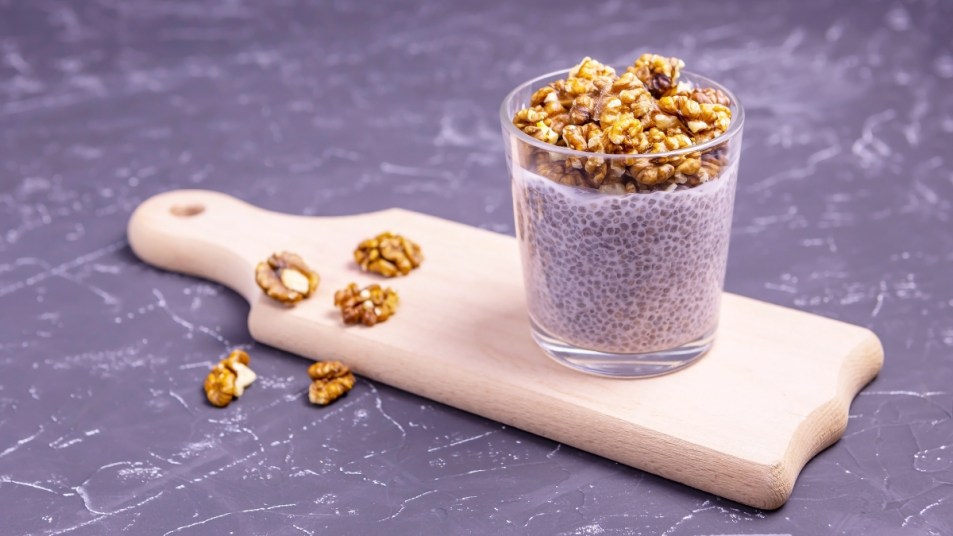This Crunchy Snack Can Help Reduce Arthritis Pain and Inflammation

Transitioning into the colder months is difficult if you suffer from rheumatoid arthritis. When temperatures drop, your joint fluids can thicken, causing stiffness and restricted movement. Fortunately, you may be able to mitigate some of the effects this season by changing up your diet. Research shows that eating plenty of nuts and seeds boosts joint health and may lessen arthritis pain.
Nutrient-packed nuts and seeds can also reduce your risk of heart disease. Paying attention to your heart health is crucial if you have arthritis. According to the Arthritis Foundation, you are almost twice as likely to get heart disease if you have arthritis as compared to those without the illness. Chronic inflammation can damage blood vessels and cause plaque to collect in arteries. However, you aren’t destined to get cardiovascular disease. With the right diet and regular medical screenings, you can take control of your health and manage your pain.
Why Nuts and Seeds May Reduce Arthritis Pain
Rheumatoid arthritis takes a very real toll on your joints, especially those in your hands, wrists, and knees. The disease causes inflammation in the lining of the joint, which damages joint tissue and results in chronic pain.
It makes sense, then, to eat nutrients that improve joint health. A study published in the American Journal of Clinical Nutrition found that eating more nuts significantly reduced inflammation in over 5,000 participants. The nuts they tested included peanuts, peanut butter, and all tree nuts, such as almonds, Brazil nuts, walnuts, cashews, hazelnuts, pecans, and pistachios. The researchers admitted that they found no links between peanut butter and lower inflammation. However, other nuts made an important difference. Swapping three servings of red meat, processed meat, eggs, and refined grains with three servings of nuts every week dramatically improved inflammation levels. According to the researchers, one ounce of peanuts or other nuts counts as one serving.
Certain seeds also have excellent anti-inflammatory benefits. Chia seeds and flaxseed are high in alpha-linolenic acid or ALA, which is a type of omega-3 fatty acid. Research from the Journal of Nutritional Biochemistry shows that ALA is a powerful anti-inflammatory nutrient that could reduce cell damage in the body. In addition, a systematic review from the journal Nutrients showed that consuming flaxseed and its derivatives, such as flaxseed oil, drastically reduces inflammatory markers in the bloodstream. Inflammatory markers are certain proteins that the body releases into the blood during inflammation.
The Link Between Omega 3s and Joint Health
The common theme with nuts and seeds is that they all contain omega 3 fatty acids. While omega 3s are best known for improving heart and brain health, they do an excellent job of reducing inflammation in those with arthritis. Research from the Mediterranean Journal of Rheumatology states that omega-3 fatty acids may diminish and even prevent pain from arthritis. But how do they benefit the body on a molecular level?
As explained by the researchers, omega 3 fatty acids may help control the release of cytokines into the body. Cytokines are small proteins released by immune system cells that help all cells in the body communicate. Certain types of cytokines are inflammatory and can create a strong immune response. In people with arthritis, cytokines can lead to chronic inflammation in joint tissue. Thus, eating omega 3s can curb inflammation caused by these small proteins.
Also, some nuts contain high amounts of magnesium, l-arginine and vitamin E, three nutrients that can regulate inflammation. Animal studies have shown that a magnesium deficiency can heighten the body’s inflammatory response. L-arginine, an amino acid that the body uses to make protein, may also work to prevent a strong inflammatory response in body cells. Vitamin E reduces inflammation by also preventing cells from releasing inflammatory cytokines.
The Best Nuts and Seeds for Arthritis
While all nuts and seeds offer benefits for arthritis patients, several contain particularly powerful nutrients that cut down on inflammation. Those include walnuts, peanuts, almonds, pistachios, flaxseed, and chia seeds, according to the Arthritis Foundation.
The best part? You don’t need too many nuts and seeds in your diet to get the benefits. They are so packed with nutrients that just a handful or so each day should do the trick. The USDA notes that one serving of nuts is about one ounce, or a small handful. That’s equal to:
- 12 to 14 walnut halves.
- About 35 peanuts.
- 20 to 24 whole almonds.
- About 49 shelled pistachios.
- 1 to 2 tablespoons of flaxseeds.
- 1 to 2 tablespoons of chia seeds.
If you’d like to get your anti-inflammatory benefits through oil, just one tablespoon of flaxseed oil or one tablespoon of walnut oil per day is plenty. While no food can cure rheumatoid arthritis, the nutrients in nuts and seeds may reduce enough inflammation to ease your symptoms and improve your quality of life.












